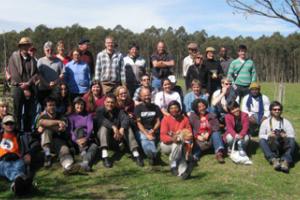The Dayak have inhabited the forest in Kalimantan for a long time before the current State of Indonesia was established. Their adat (custom) has ensured the integrity of the environment and the forest until imposed commercial exploitation started to devastate, damage and encroach on their customary land. Since then, they denounced that decades of destructive projects imposed either directly or indirectly by the Government have progressively disempowered and impoverished the Dayak through the uncontrolled and often illegally issuing of permits and/or concessions through corruption.
Large-Scale Tree Plantations
Industrial tree plantations are large-scale, intensively managed, even-aged monocultures, involving vast areas of fertile land under the control of plantation companies. Management of plantations involves the use of huge amounts of water as well as agrochemicals—which harm humans, and plants and animals in the plantations and surrounding areas.
Other information
30 October 2011
Other information
30 October 2011
For more than 20 years, Colombia has seen the ongoing expansion of monoculture tree plantations, to the benefit of transnational companies who have enjoyed and continue to enjoy the support of government policies. To analyze this continued expansion, whose consequences include land grabbing, rights violations and the displacement of communities, CENSAT-Friends of the Earth Colombia organized a forum entitled “Tree Plantations in Colombia: A Critical Look”, held in Bogotá on September 21, the International Day Against Monoculture Tree Plantations.
Bulletin articles
30 October 2011
In Africa there is a story that has been passed down through the years about a woman from Mali named Nyéléni, who challenged patriarchal power by excelling at something that was considered “men's work”: agriculture. As well as defeating her male opponents in farming competitions, she also managed to overcome the arid climate and domesticate crops like fonio and samio, which made it possible to feed the whole population of Mali .
Bulletin articles
30 October 2011
I come from a family that considers seeds as something sacred. Back in my father's day, our neighbours could sleep peacefully, because they knew that my father had a safe supply of seeds to plant. (Family farmer, Paraíba)
Other information
30 September 2011
We live in times of warming. Perhaps the climate is the most obvious expression of an economic acceleration that has warmed up its engines, burning everything in its path. In just a few short decades, productivity has grown enormously. We have seen the emergence of economies of scale, an ever increasing accumulation of capital, a rising number of corporate mergers, the expansion of markets, globalization.
Other information
30 September 2011
On this International Day Against Monoculture Tree Plantations, the Latin American Network Against Monoculture Tree Plantations (RECOMA), a network of Latin American organizations with the basic objective of coordinating activities to oppose the expansion of large-scale monoculture tree plantations on a regional level, with representatives from several Latin American countries, in conjunction with other social organizations and activists, is launching an open call for opposition to the so-called New Generation Plantations Project (NGPP) promoted by the World Wide Fund for Nature (WWF), an
Other information
30 September 2011
Industrial tree plantations have often expanded through direct land expropriation and through manipulative land purchase. But there is a third kind of mechanism by which such expansion indirectly occurs, a mechanism that is somehow less-known although it is probably as important – if not more – than the two previous ones: debt relations. This short article intends to shed some initial light on this mechanism with special reference to commercial tree crops in Indonesia.
At the level of the small planter
Other information
30 September 2011
Hundreds of trees of native species used by local communities – such as neem, lemon, sehjan, amla, jamun, mango, chironji and mahua – were symbolically planted in the District Court headquarters in Robertsganj, capital of the district of Sonbhadra in the northern Indian state of Uttar Pradesh, on July 4, 2011 by tribal women to protest the tree plantation drive being undertaken by the Forest Department, with funding from the Japan International Cooperation Agency (JICA).
Other information
30 September 2011
In the South East of Africa, Mozambique glimmers like a bright jewel in the African sunlight.
The coastline stretches thousands of kilometres, the warm Indian Ocean feeding the abundance of life. Ragged tooth and Zambezi sharks patrol the coral reefs, alive with sounds in an underwater spectacle of a wide variety of colourful fish, manta rays and turtles. Line-fish, muscles, crabs, shrimps, prawns and crayfish, these rich food resources are available in Mozambique, and have been feeding the people for thousands of years.
Other information
30 September 2011
Oil palm has historically played an important role in Benin and oil palm plantations, as opposed to naturally occurring palm groves, were established in the 19th century to meet an increasingly greater demand for palm oil from Western countries, primarily to supply their soap factories.By this time, oil palm was grown on an estimated 500,000 hectares of land in Benin, and the processing of oil palm products was entirely manual, carried out by women small-scale producers.
Declarations
21 September 2011
September 21, 2011 – Montevideo, Uruguay
On the occasion of the International Day of Struggle Against Tree Plantations, September 21st, social environmental organisations from Africa, Latin America, Asia and Europe gathered in Montevideo in order to exchange knowledge and experiences of resistance to the impacts of tree plantations.
Other information
10 September 2011
Dear friends,
We would like to invite you to support the following action, which is being launched as part of the activities for the International Day Against Monoculture Tree Plantations.
This action is being coordinated by our friends at CEPEDES in Brazil, who have been working for years to support and coordinate resistance to the expansion of monoculture eucalyptus plantations and the pulp mill owned by Veracel Celulose.


